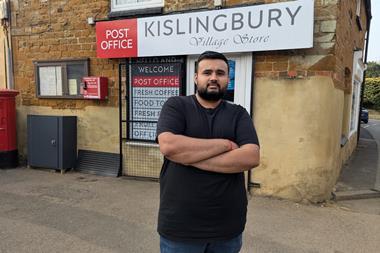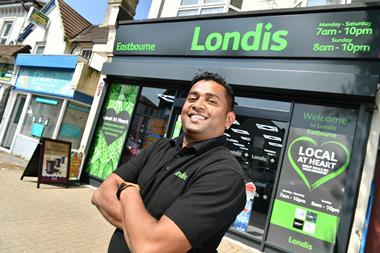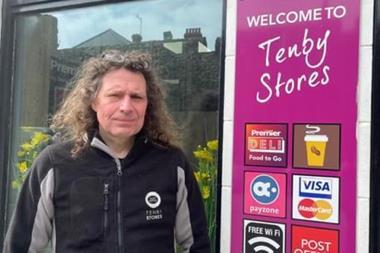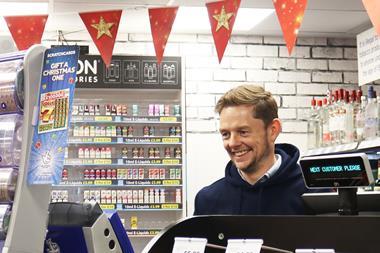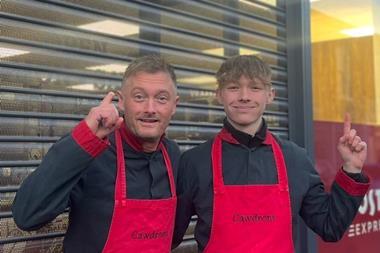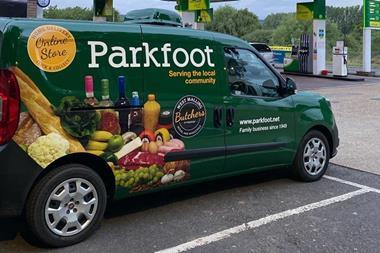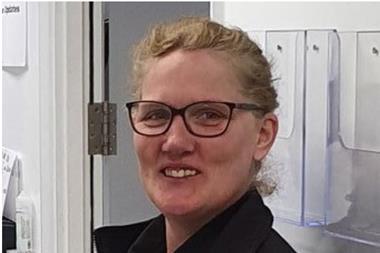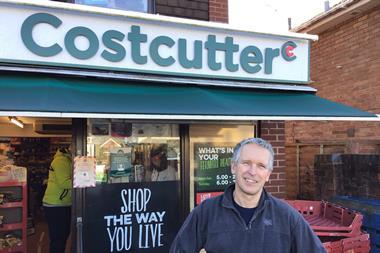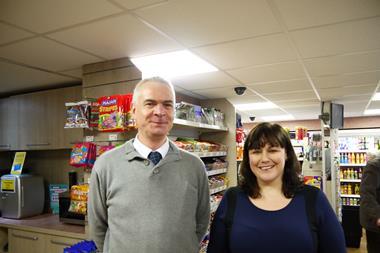Orford General Stores owner Penny Teale applies her experience with the multiples to her c-store business. Sarah Britton reports
It’s a delightfully sunny day when C-Store visits the picture postcard village of Orford in Suffolk. Ahead of us lies a quaint village store, where row upon row of fruit and veg outside creates a rainbow of colour, and a bright assortment of flower pots and windmills harks back to the good old days. But if you thought this chocolate box store was stuck in the past, you’d be very much mistaken.
Sporting snappy pink glasses and a shock of red hair, owner Penny Teale is much more urbanite than her surroundings would suggest, and her attitude is as sharp as her attire. “It’s not a love project this is business,” she says matter-of-factly when asked about the store.
Of course, it’s clear from the off that Penny cares a great deal about the success of the shop. But what she means is that every item stocked has to earn its place.
“Too many retailers choose things they like themselves, rather than what customers want,” she says. “I apply financial rigour. We’ve got a full epos system in here and I analyse everything every week. I give a new line six weeks and if it doesn’t move, it goes.”
The store is part of the Premier group, but Penny has bargained hard to retain as much individuality as possible. A subtle logo on the store’s canopy states that it is sponsored by the group, but there is none of the bold branding associated with the symbol. “I’m not covered in purple and yellow,” she says. “It’s a conservation area for one, so we wouldn’t get permission for the Premier fascia. But also, I’m not your standard store. I wanted to be different.”
Store profile
Orford General Store, Suffolk
Size: 2,000sq ft
Staff: six full-time, seven part-time
Opening hours: Monday-Saturday 8.30am-5.30pm Sunday 10am-4pm
Additional services: café, post office, butchers, ATM, home delivery
She states that Orford is home to a very varied customer base, which means she uses her own ranging systems, rather than relying on symbol-supplied planograms. “Because symbols have such a broad brush of customer, their ranges aren’t targeted at the 5-10% of shops who have a more affluent customer base,” she explains. “Booker offers advice if I need it, but I find their guidance too generalised. If you are prepared to invest time analysing the numbers via epos then you know your own shop and what goes where.”
It comes as no surprise to hear that Penny was previously business unit director of general merchandise at Sainsbury’s and has spent the five years prior to buying the store working as a retail consultant. So when she finally decided to try her hand at convenience retail in 2010, she already had a good idea of what she wanted to achieve.
“One of the key things I did when I bought the store was to change the fruit and veg supplier so that we no longer used pre-packed. Customers want to feel the fruit before they choose what they want. I have a wholesaler who sources it for me. It’s all fresh, loose and locally sourced wherever possible.”
Local sourcing is central to the store’s ethos. “Suffolk people like to source and buy locally. Some 40% of our produce is sourced from more than 60 local suppliers,” she says proudly. The store boasts a rich deli counter, filled with pâtés, meats, pastries and more than 40 cheeses, many of which are from Norfolk and Suffolk. Bread, soup, fish, pies and chutneys are all locally sourced, too.
The store has an adjoining butcher’s shop, where 99% of the meat is sourced from 15 miles away or nearer. “We know the producer and the cow - there’s definitely no horsemeat in here!” grins Penny. “Our butcher, Mikey, makes our sausages and will cut or prepare anything customers want for a meal.”
The store’s café is stocked with sausage rolls made with meat from the butchery, a range of loose teas from Butterworth’s in Halesworth, and scones and Scotch eggs made in the village.
With the store serving a broad mix of customers, from tradesmen and pensioners, to families, holiday-makers and second home-owners, Penny ensures that the shop appeals to everyone by employing a good, better, best principle. “For example, we have a cheap entry point commercial Danish bacon, then the mid-tier branded option - Wall’s bacon - and top-tier locally sourced bacon. It’s about good retail principles.”
The store’s wine section also has something for every budget. Penny has a level three qualification from the Wine & Spirit Education Trust - so she knows what she’s talking about. “I source most of my wine from two independent wine merchants, with the exception of Gallo and Jacob’s Creek,” she says. “I don’t do Champagne brands that you’ll recognise, such as Moët or Tattinger. I do lesser-known brands that are better quality and retail at a better price.”
She also keeps her eyes peeled for deals, which she passes on to customers. “I buy bin ends so I can sell them at a really good price. I also do wines at the higher price end, up to £34.99 a bottle.”
Although making the shop affordable for all pockets is important, Penny is frustrated by the amount of pricemarked packs in particular categories. “Pricemarking has driven down the value of items such as biscuits and cereals,” she says. “I understand why it happens, but it drives down margins. As a shopkeeper I want to set my own prices, and customers can find value from promotional activity and the fact that we do a weekly price check.”
Every week, Penny runs a price check on 40 items benchmarked with Tesco and Waitrose “to make sure we’re credible on price”. She knows that she can’t match them like for like, but hopes to end the perception that convenience stores are expensive. “We can’t beat them on promoted brands, but we can beat them with our local products.”
Her passion for the business side of retail might lead you to conclude that Penny has little time for the social side of the job, but this couldn’t befurther from the truth. She might be a tough negotiator, but her no-nonsense demeanour melts away altogether when chatting to customers. She has an in-depth chat about the store’s butchery services with an elderly lady during our visit, and merrily teases a man who comes in wearing sunglasses - “I thought you were Bono!”
And her tone becomes even more affectionate with customers of the four-legged variety. “Hello, little dude!” she cries, bending down to pet a customer’s dog, before giving him a treat. “This will make poor Spike very jealous.”
Spike is Penny’s beloved Yorkshire Terrier, who is waiting patiently upstairs to be taken out for a walk. He plays a central role in the online personality of the store as chief blogger on the shop’s website, where he is currently raving about the store’s new Pooch dog biscuits.
“I already sold Schmackos and Bonio, but not quality produce like Pooch biscuits, which are made with cereal and red meat,” says Penny. “We ran a tasting session for dogs at a recent food fair and it did really well!” she beams.
It’s ideas like dog blogs and pet food tastings that ensure the store remains a talking point. Penny’s next marketing venture is to roll out the store’s own brand of Orfordly Good products on everything from ready meals to sticks of rock. “I’ve got another six months to get the ranges absolutely right and introduce Orfordly Good,” she says. After this, she hopes to buy another store - if she can find the right property at the right price.
She may have worked in the cut-throat world of the multiples, but Penny is adamant that convenience retailing is just as demanding. “Running a c-store is really hard work. You still have to work the same hours as in the commercial world - it’s 70 hours across seven days a week. You have to apply big business principles and overlay it with local, otherwise it ain’t gonna work.”•





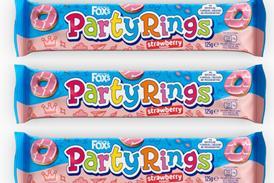
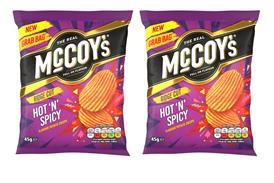
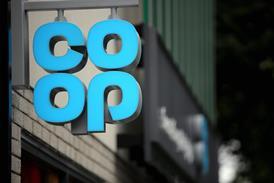

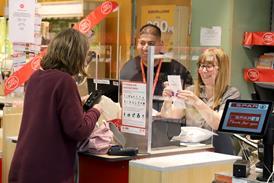

![WG-4003[58]](https://d2dyh47stel7w4.cloudfront.net/Pictures/274x183/4/5/1/353451_wg400358_6083.jpg)




